Israel
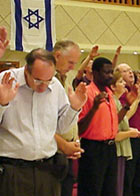 Marranos in Reverse?
Marranos in Reverse?Tuesday, March 9, 2010 | Jewish Ideas Daily » Daily Features
At first blush, the blog reads like any modish commentary on the weekly Torah portion, complete with knowing references to the Mishnah and the building of the Tabernacle in the desert. Only upon closer examination does it become evident that the discussion of the tabernacle as a medium for drawing nearer to God is a precursor to the claim that, nowadays, God can be worshipped "directly." The blogger is a follower of "Yeshua"—a Jewish believer in Jesus. In Jewish eyes they are apostates, but a group of "Messianic Jews" living in Israel say they follow authentic Jewish lives in the footsteps...
 Are We One?
Are We One?Wednesday, March 3, 2010 | Jewish Ideas Daily » Daily Features
The hate-fest known as "Israeli Apartheid Week," now taking place in cities around the globe, is bound to affect the morale of Diaspora Jews, if in different ways. Some may be induced to lower their pro-Israel profile, others to dissociate themselves from the Jewish state and its policies, still others to affirm their solidarity ever more resolutely. We have come a long way since the 1967 Six-Day War. Before that watershed event, Diaspora Jewish life was not noticeably animated by a vigorous commitment to Israel's cause. But the country's spectacular victory in war, in tandem with the energies released by the...
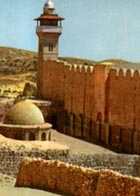 On the Heritage Trail
On the Heritage TrailTuesday, March 2, 2010 | Jewish Ideas Daily » Daily Features
Unlike Ariel Sharon, Prime Minister Benjamin Netanyahu did not have to take a stroll on the Temple Mount to provoke Palestinian Arab leaders into threatening mayhem. Instead, Netanyahu simply announced a comprehensive plan to strengthen Israel's national heritage by rehabilitating and preserving archaeological and historic sites, developing historic trails, and conserving photographs, films, books, and music of archival value. "A people," he declared, "must know its past in order to ensure its future." Unveiled on February 2, the plan was greeted with a yawn by the mainstream Israeli media, mixed with a few deprecating remarks about Jewish chauvinism, and was largely ignored by Palestinians....
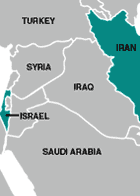 Iran
IranIran's nuclear program marches on: an existential threat to Israel—target of Tehran's declared genocidal intent—and an immense strategic challenge to the United States and the West as well as to Muslims, Arabs, and others with a stake in geopolitical stability. The Iranian regime has made no bones about seeing this moment as an historical hinge, marked by the rout of American influence and the rise of Tehran as the region's dominant power. As Mahmoud Ahmadinejad proclaimed last week at his meeting in Damascus with the complaisant Bashar al-Assad, Hassan Nasrallah, and Khaled Mashal, the Americans "have reached a dead end. They once...
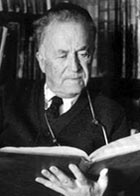 Agnon
AgnonThursday, February 25, 2010 | Jewish Ideas Daily » Daily Features
In 1966 a diminutive man, a large black kippah perched on his head, was awarded the Nobel Prize for literature. His acceptance speech, delivered in the lilting cadences of his native Galicia, brimmed with allusions to holy texts, conjuring up an evanescent aura of piety and sacred longings. Yet underneath that kippah, and vibrating in the spaces between the ancient Hebrew words, was one of the most cunning minds and radical pens in Jewish literary history. Born Shmuel Yosef Czazkes in the town of Buczcacz, S. Y. Agnon, who died 40 years ago today at the age of eighty-one, moved to...
 Holy Societies
Holy SocietiesFriday, February 19, 2010 | Jewish Ideas Daily » Daily Features
In the Hebrew calendar, Sunday February 21 is the seventh day of Adar, the date traditionally marking the death of Moses on Mount Nebo, overlooking Canaan, alone with God. The Lord's personal oversight of Moses' interment, in a place "unknown to this day" (Deuteronomy 34:6), inspired the rabbis of the Talmud to praise the act of burying the dead with dignity as an expression of true (because unrecompensed) kindness and indeed of imitatio dei, the injunction to follow God's ways. So it is that the seventh day of Adar is designated by tradition to honor the institution of the Hevra Kadisha, the "holy society"...
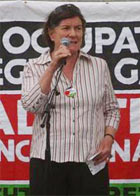 Libels and Politics
Libels and PoliticsThursday, February 18, 2010 | Jewish Ideas Daily » Daily Features
Here we go again. Baroness Jenny Tonge of Britian's Liberal Democratic party called recently for a serious investigation of charges that Israeli rescue teams were in Haiti to harvest organs. In the ensuing firestorm, she has been removed from her role as "health spokesman" for her party in the House of Lords. What is going on here? It is one thing for Hamas to fling about heinous lies. Among Western elites, "Israel-bashing" seems too thin an explanation for the mounting eruptions of lunatic forms of anti-Semitism, unhinged from even the most severe criticisms reasonable people might make of Israeli policies. Are we...
 New Communities
New CommunitiesTuesday, February 16, 2010 | Jewish Ideas Daily » Daily Features
Recent years have seen a surge of new Jewish communities: experiments in communal living like Moishe House, urban kibbutzim in Israel's inner cities, back-to-nature programs combining organic farming, kashrut, and "eco-justice," and, perhaps most notably, independent minyanim in the U.S., Israel, and elsewhere. These last—communities focused principally or exclusively on prayer—shun not only the formality and organizational heft of most synagogues but also the labels and authority of denominational Judaism. Some of the most prominent have been created by Orthodox Jews seeking to make room for greater participation by women; others comprise young people experimenting with their own forms of...
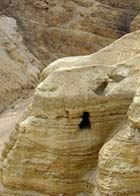 A Dead Issue?
A Dead Issue?Monday, February 15, 2010 by Elli Fischer | Jewish Ideas Daily » Daily Features
Since the electrifying discovery of the Dead Sea Scrolls at Qumran in the late 1940's, the scholarly consensus has been that they were produced by the Essenes, a small Second Temple-era Jewish sect known to us from Josephus. Last year, a book by Rachel Elior, Memory and Oblivion: The Secret of the Dead Sea Scrolls (Hebrew), upended this seemingly settled issue by contending that, in fact, the Essenes never existed. Elior's revolutionary thesis, argued with force and stridency, has been discussed in major mainstream publications from Israeli newspapers to Time magazine. But the controversy, and clashing assessments of her achievement as a historian, have...
 China
ChinaMonday, February 8, 2010 | Jewish Ideas Daily » Daily Features
Quite apart from the implications of China's growing influence in the global economy, China's politics, both domestic and foreign, clash directly with Western concerns in areas from democracy to the rights of individuals and minorities to (especially when it comes to Iran's race to acquire nuclear weapons) the security of Europe and the Middle East. China is also interested in the Jews. It has had diplomatic relations with Israel since 1992, and Jerusalem has risked Washington's displeasure to maintain its military ties with Beijing. And China's interest extends beyond Israel, to Jewish civilization as a whole. Chinese scholars and academics seek to...
Editors' Picks
The Negev's “First People”? Havatzelet Yahel, Ruth Kark, Seth J. Frantzman, Middle East Quarterly. The Bedouin may be a poor and marginal sector of Israeli society, but this does not transform them into an indigenous nation.
Opportunity for Reform Shmuel Rosner, Jewish Journal. Now that Israel's courts brought non-Orthodox denominations one step closer to equality, those denominations must prove that they can connect with Israel's public, not just its courts.
The Immigration Consensus Noam Sheizaf, +972. While Israeli Arab MKs may never accept the Jewish claim to the land, when it comes to the claims of African illegal immigrants, they stand with the government.
The New Egypt Ariel Blumenthal, Jewish Journal. That Egypt's leading presidential candidates entertain the idea of annulling their country's peace treaty with Israel is chilling—but it's an annulment that 61 percent of their countrymen favor.
Israel on $5 a Day Nicole Rae Baerg, Fauzi Azar Inn. Why shoestring-budget travelers are better for Israel's economy than wealthy ones.
Israel Can't Solve Africa's Problems Jonathan S. Tobin, Contentions. No matter how immigrant-friendly the Jewish state may be, the idea that tiny Israel should be considered the solution for African poverty is absurd.
Ballpark Figures Jon Paul Morosi, Fox Sports. Through the Law of Return, Israel's national baseball team could recruit a number of established major leaguers.
Making "Unofficial" Jews Official Dianna Cahn, Times of Israel. Bulgaria's fast-track conversions for Jews whose identity has been erased under Communism might not meet the standards of the Israeli chief rabbinate—but the alternative is to lose them altogether.
Turkey, with a Slice of Humble Pie Paul Alster, Times of Israel. As his attempts to build an alliance with Syria and Iran have ended in disaster, the Turkish prime minister is trying to rebuild ties with Israel. And Israel should welcome him back.
Unwelcome Aliyah Ira Sharkansky, Jerusalem Post. If Israel's government is right to say that the influx of emigrants from Africa is unsustainable, it is wrong to demonize those already in Israel.

